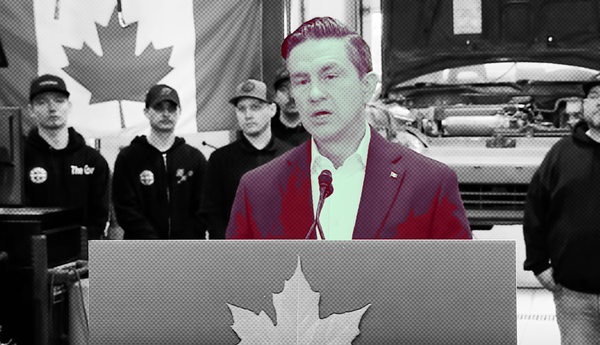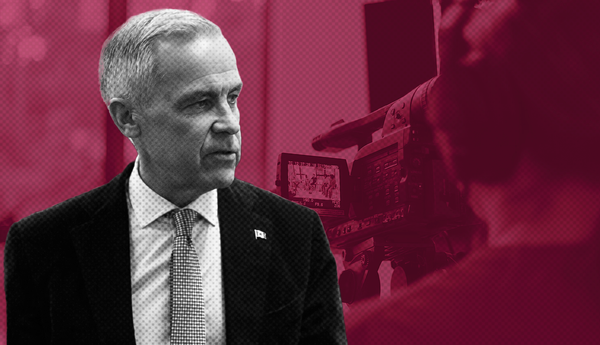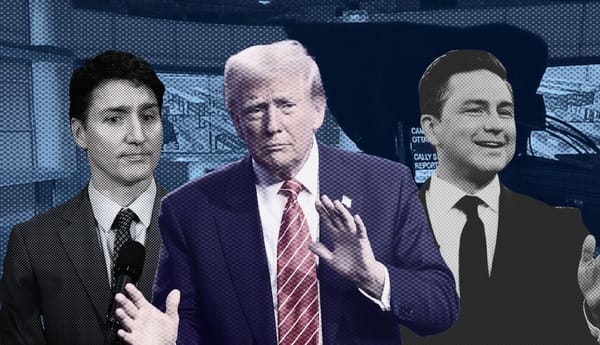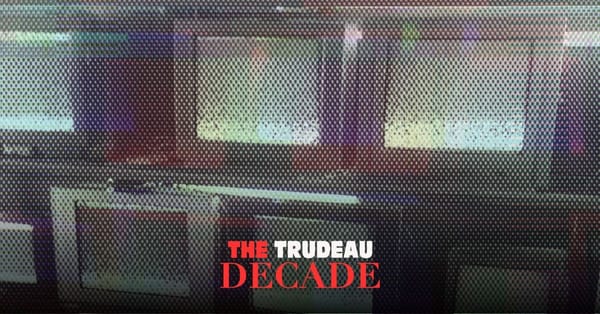It’s been more than a year since doctors in China realized a new coronavirus was spreading, and warned that the entire world was at risk. They were right.
In Ontario, there have been more than 260,000 COVID-19 cases and nearly 6,000 deaths thus far. Ontario is also lagging far behind on vaccination rates compared to other provinces in Canada, which as a whole is performing poorly on a global scale.
As I write this, the entirety of Ontario is in a state of emergency and lockdown, with a stay-at-home order mandating fines for anyone found to be in violation. But how did we get here?
If journalists write the first draft of history, as many like to claim they do, then they’re responsible for helping to get answers to this question, and holding those responsible to account.
Yet because of this role, it’s also essential that we review how journalists have been doing their jobs throughout this pandemic. This includes opinion writers. That’s what I intend to do here, with a focus on opinion writers that praised Ontario Premier Doug Ford’s handling of the pandemic in its early stages.
Here’s a reminder of some of Ford’s most damaging decisions so far:
- He has refused to implement paid sick leave, which means some frontline workers in desperate financial need have gone into work while ill, leading to outbreaks.
- He ignored warnings that long-term care facilities in the province would be the “perfect storm” for COVID-19 outbreaks due in part to his past policies, and has since further cut their funding.
- He told families to travel for March Break and enjoy themselves.
- His government has rejected the advice of its public health agency on numerous occasions, to disastrous results.
- He failed to stop evictions throughout the entirety of the pandemic, and in fact tabled legislation that allows evictions to take place more quickly. In November, mass evictions of tenants began, with some people being kicked out of their homes in less than 60 seconds.
- He failed to implement anything close to proper COVID-19 protocols when schools were reopened last year, due in large part to an unwillingness to provide adequate funding.
- He decided to lift restrictions on bars, restaurants, gyms and casinos as cases were surging in the midst of the second wave.
- He decided to implement a lockdown throughout the province on Boxing Day instead of before Christmas Eve, and when asked why, claimed he wanted to allow businesses to sell more inventory.
- He is sitting on more than $6 billion in emergency COVID-19 funding.
The examples go on. None are a surprise, as they align with Ford’s right wing ideology that he has openly expressed for years, or are a direct result of decisions he made prior to the pandemic.
Opinion writers in corporate media shouldn’t be able to just pump out takes and move on. We can hold them accountable by, at the very least, not forgetting what they thought and predicted. After reviewing these early pro-Ford articles, however, I suspect there’s quite a bit the writers would like us to forget.
I found that close to none of the praise offered to Ford in the articles I reviewed had anything to do with his policy decisions. There was usually no mention of case numbers or deaths. No details of specific policies Ford had put into place that would help save lives. There were some claims made that he was listening to experts, yet no discussion of the actions he took that were supposedly guided by these conversations.
In fact, in many of these articles, the only policy mentioned was Ford’s egregious decision to encourage people, in a March 12 briefing to the province, to go on March Break vacations in the midst of the pandemic, saying, “I just want the families and their children to have a good time. Go away, have a good time, enjoy yourself.” Yet these articles all effectively downplayed that decision’s significance. Here are a few examples.
In a March 19 TVO article titled, “The biggest political surprise of the COVID-19 crisis? Doug Ford,” Steve Paikin wrote, “Conversely, Ford learned from his one misstep. No doubt in an attempt to calm the choppy waters, Ford urged people to travel, have fun, and get away during March break. He quickly realized that kind of freelancing was unacceptable during a global pandemic, and, ever since, he has been on point with his advice and stewardship of the crisis.”
In a March 22 Toronto Star article titled, “Doug Ford has risen to the coronavirus challenge,” Jaime Watt wrote, “If there has been one misstep, it was his comment that families should go away for March Break and ‘have a good time.’”
In an April 3 Maclean’s article titled, “Doug Ford’s surprising turn,” Max Fawcett wrote, “When the coronavirus first appeared in Canada, and Ford encouraged people to continue with their spring break plans, it looked as though he would make a predictable hash of his province’s response. Then, as if by magic, the combative and error-prone premier was replaced by a different Doug Ford—one who projected an unmistakable air of calm, competence and decency.”
In an April 4 National Post article titled, “Doug Ford’s COVID-19 performance lays waste to the caricatures of his critics,” Chris Selley wrote, “The premier has attracted much praise for his performance during this crisis, and it is deserved. His last misstep was advising families to head off on March Break as planned, viruses be damned, but that might as well have been 100 years ago.”
These articles effectively ignored talking about policy, with the only example discussed being one of Ford’s first boneheaded decisions, which would become emblematic of how he has handled the pandemic. With that in mind, what was all the early praise for Ford ultimately based on?
Here are a few of the main features of the positive reaction articles to Ford’s early handling of the pandemic, as well as some bonus quotes.
Political Theatre
The people that get paid to offer critical analysis in Canada instead often act like a pack of trained seals, clapping in response to the most shallow performative acts or rhetorical flourishes from politicians. This trend was on display in the writing praising Ford’s early handling of the pandemic.
In the aforementioned article, Jaime Watt wrote, “As the crisis has deepened, Ford is exemplifying the tenets of good crisis communication. He has been transparent and forthcoming, hosting daily briefings which may seem routine, but are in fact distinguished by attention to small details. The premier begins promptly on time, wearing a suit and tie.”
Should Ford get credit for remembering to zip his fly up in the morning too?
In a March 30 Toronto Star article titled, “Doug Ford becomes the unlikely leader that his province needs,” columnist Martin Regg Cohn writes, “Ford begins by reading a carefully crafted script from his Teleprompter, slowly and deliberately emphasizing the day’s key messages and public safety warnings. He ends by staring directly into the pool camera […] to deliver a more typically American rhetorical flourish: ‘Thank you, and God bless the people of Ontario.’”
Ford can read. Incredible.
In the aforementioned article, Max Fawcett wrote, “When Ford, who is famous for fielding phone calls from constituents against the advice of his political staff, got wind that an Ontario medical supply company was donating 90,000 masks to hospitals in the province, he personally drove over to their warehouse in Markham and loaded them onto his truck—and didn’t tell anyone.”
It’s a shame Max can’t recognize clear PR stunts.
In a May 7 Toronto Star article, columnist Rick Salutin wrote, “I’ve become fond of Doug Ford and his clichés. […] It’s quite lovable, I’m afraid.”
The examples go on.
Trump Comparisons
Canadian political writing often suffers from using the United States as a benchmark to assess how we’re doing. That is, to say the least, a very low bar in normal times, but throughout this pandemic about the lowest you can go. So, predictably, several writers favourably compared Ford to Trump as proof he was doing a good job. Or at least attacked those they claim were making the comparison in the past. Here are a few examples.
In the aforementioned article, Steve Paikin wrote, “Unlike some other leaders (yes, you, Donald Trump), Ford has never tried to downplay the significance of the crisis.”
This article was published a week after Ford told families they should travel for March Break.
In the aforementioned article, Martin Regg Cohn wrote, “Even if his briefings do not soar to the rhetorical heights of N.Y. Gov. Andrew Cuomo in the eye of the COVID-19 storm, they do not stoop to the buffoonery and bellicosity of Donald Trump’s White House monologues.”
I’d write something insulting about Ford here, but the quote does it for me by noting he’s worse than Cuomo.
In the aforementioned article, Chris Selley wrote, “More than a few people have remarked: ‘Wasn’t this guy supposed to be Canada’s Donald Trump?’ Indeed, once upon a time, those comparisons flew thick and fast. But they were always absurd — a toxic by-product of the Canadian media’s mortifying obsession with all things American.”
It appears Selley thinks Trump-Ford connections are absurd when they’re done to critique the premier, yet worth mentioning if they make him look good.
On April 7, in a Washington Post article titled, “A crisis can forge great leaders. Doug Ford is showing that in Canada,” Michael Taube wrote, “The political left’s days of comparing Ford to Trump may finally be over. This helps explain why Ford’s leadership has received praise from across the political spectrum.”
Trump handled the pandemic worse than any world leader, yet favourable comparisons to him were put forth as if they have any significance.
Self-Loving Journalists
Journalists are supposed to cover politicians, and yet due to an incredible sense of self-importance, so many in the media also crave the approval of the political class. They believe they are absolutely essential to a functioning democracy, and they want the people they’re reporting on to think so as well. As such, it’s not a surprise one of the praises offered of Ford was effectively, ‘He’s being nicer to us!’
In the aforementioned article, Steve Paikin wrote, “Things have changed so much at Queen’s Park, the premier actually said these words earlier today: ‘I want to thank the media. You’re playing a massive role in helping us out.’ And perhaps the biggest shockeroo: ‘There are a lot of great articles in the Toronto Star.’”
In the aforementioned article, Chris Selley wrote, “Where once Ford railed at his media critics, now he praises their efforts covering the crisis and informing Ontarians.”
In the aforementioned article, Michael Taube wrote, “He has spoken highly of the media — once his mortal enemy — including a cameraman who responded in appreciation.”
These quotes leave me to wonder: Why should it matter if Ford says nice stuff about the media? We should be asking instead whether his praise is deserved, why he is giving it, how genuine it is, and if it also functions to help keep journalists more ‘civil’ with him, which benefits no one.
I’m sure these writers would say that they were just reacting to what was available at the time. To this, I have two replies.
1) These opinion writers were wrong then, and they are wrong now. It didn’t take a genius to see where Ford was leading us, as evidenced by those critiquing him throughout this same period as these writers were heaping praise.
2) The particular ways these writers were wrong give us insight into how the commentariat in corporate media fails us as a whole. So it’s not just about whether they were right or wrong, but what they based their right or wrong opinion on, and what that says about them.
To riff off a legendary rant by former NFL coach Dennis Green, Doug Ford is who we thought he was, and journalists let him off the hook. We deserve better.
Bonus Quotes
- “Many can’t believe they’re praising a man they’ve despised for so long. A few sense it’s an act and wait impatiently for the other shoe to drop. […] But make no mistake about it: This transformation isn’t an act.” — Michael Taube
- “This is not the Premier Doug Ford of a year ago.” — Chris Selley
- “If Dalton McGuinty was the kindly ‘Premier Dad’ of a less anxious era, then Mr. Ford is Tough Love Dad. Right about now, people find Tough Love Dad to be reassuring.” — Globe and Mail Editorial Board
- “But today, in the midst of a crisis, amid shortages and suffering, it is a relief that Ford has struck a tone that speaks to all Ontarians. Give him credit for being the best premier he can be when his province needs him most.” — Martin Regg Cohn
- “The coronavirus pandemic has produced a lot of unexpected outcomes […] But few have been more surprising than Doug Ford’s transformation from a carbon-tax hating, license-plate bungling premier into an inspirational national leader. It is, to borrow a term from professional wrestling (an art form that has more in common with politics than some might want to admit), the biggest babyface turn in Canadian political history—and it may well end up saving his political career.” — Max Fawcett
- “He has dealt with this emergency in a non-partisan fashion. To date, he has chosen to listen to science and to make decisions based on information and whatever evidence is available. He has spoken in an assured way. […] One cannot escape the feeling that there is an adult in the legislative house, and that alone provides some comfort. It is uncomfortable for me to admit this. It is not easy to heap praise in his direction. There are things he has done that I have not agreed with – pre-pandemic policies that I think are just plain wrong. But right now, at this moment, Mr. Ford is showing himself to be a true leader. And for that, he deserves all Ontarians’ credit and support. — Marie Henein







